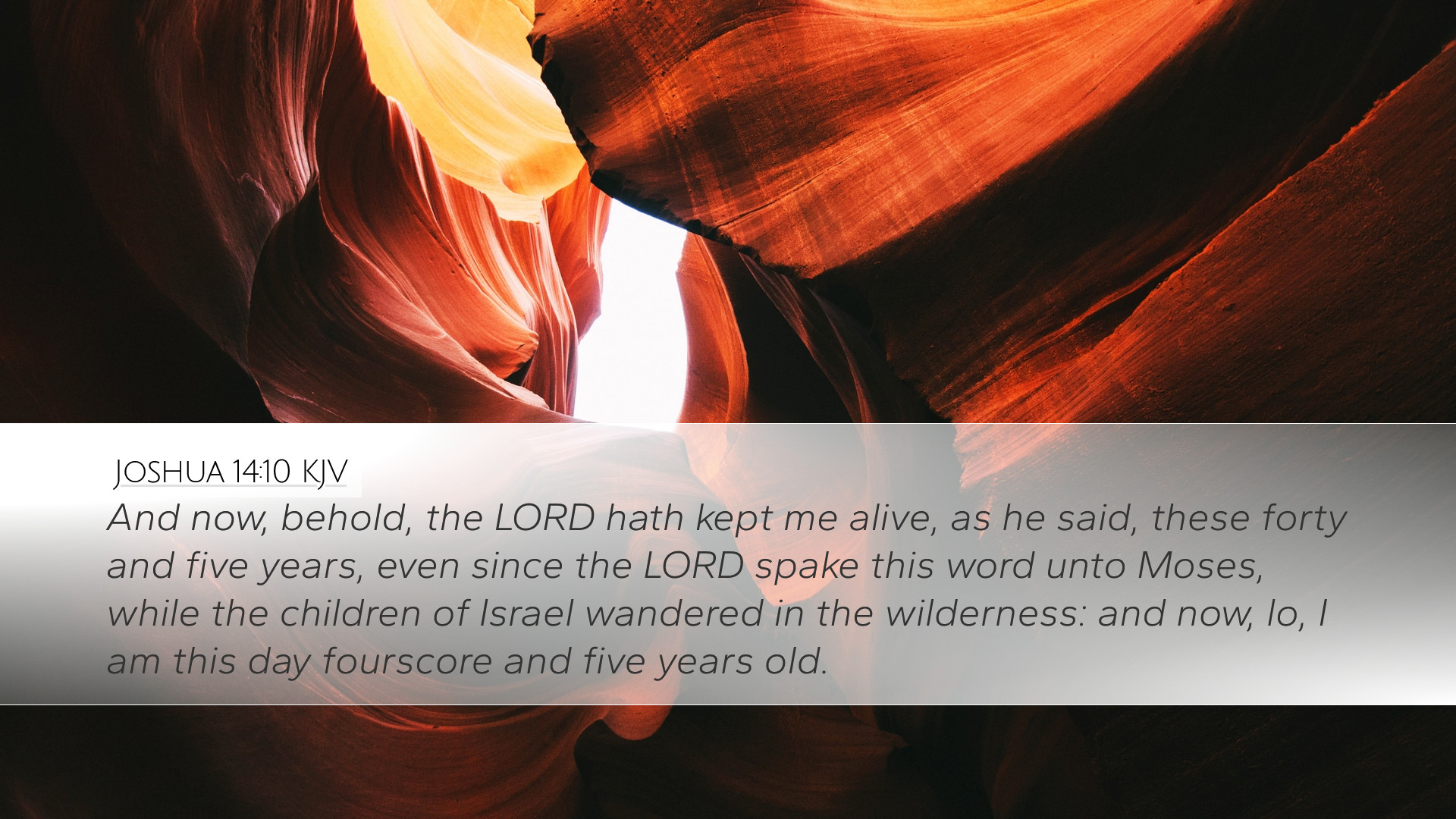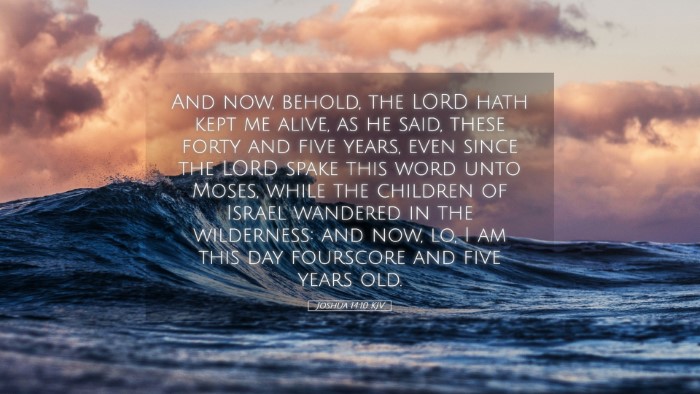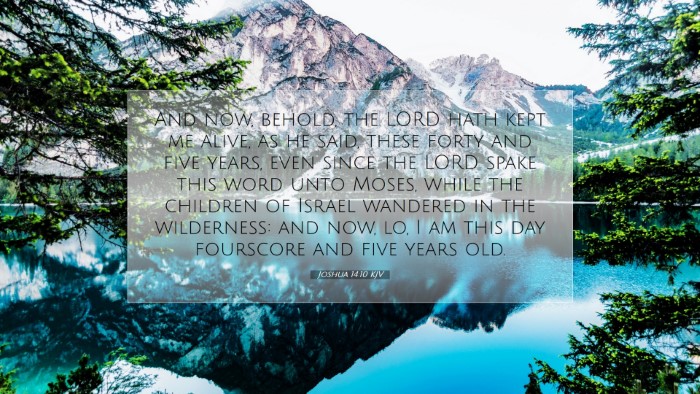Old Testament
Genesis Exodus Leviticus Numbers Deuteronomy Joshua Judges Ruth 1 Samuel 2 Samuel 1 Kings 2 Kings 1 Chronicles 2 Chronicles Ezra Nehemiah Esther Job Psalms Proverbs Ecclesiastes Song of Solomon Isaiah Jeremiah Lamentations Ezekiel Daniel Hosea Joel Amos Obadiah Jonah Micah Nahum Habakkuk Zephaniah Haggai Zechariah MalachiJoshua 14:10
Joshua 14:10 KJV
And now, behold, the LORD hath kept me alive, as he said, these forty and five years, even since the LORD spake this word unto Moses, while the children of Israel wandered in the wilderness: and now, lo, I am this day fourscore and five years old.
Joshua 14:10 Bible Commentary
Commentary on Joshua 14:10
Bible Verse: "And now, behold, the Lord hath kept me alive, as he said, these forty and five years, even since the Lord spake this word unto Moses, while the children of Israel wandered in the wilderness: and now, lo, I am this day fourscore and five years old."
Introduction
This remarkable verse from the book of Joshua reveals the steadfastness of God's promise and the faithfulness of His servant, Caleb. The context of Caleb's statement, delivered at the age of 85, provides rich insights not only into his personal journey but also into the broader narrative of God's people. The commentaries of Matthew Henry, Albert Barnes, and Adam Clarke offer profound reflections that are pertinent for pastors, students, and theologians alike.
Contextual Background
The historical backdrop of this verse is crucial. Caleb was one of the twelve spies sent by Moses to scout the land of Canaan (Numbers 13). While ten spies brought back a discouraging report, Caleb and Joshua believed that with God's help, they could conquer the land. This faithfulness resulted in Caleb receiving a unique inheritance in Canaan. As former slaves turned wanderers, the Israelites’ faith journey was crucial in shaping their identity as God’s chosen people.
Theological Insights
God's Faithfulness
This verse emphasizes the theme of divine faithfulness. Caleb explicitly states that the Lord has kept him alive as He promised, serving as a reminder that God’s word is unwavering. As Matthew Henry notes, “Caleb’s life is a testament to the reality of divine providence, sustaining him for the fulfillment of His promise.” The enduring nature of God's promises not only applies to Caleb but resonates with the continuous assurance that believers have today.
The Significance of Age
Caleb's acknowledgment of his age (85 years) invites contemplation on the role of age and experience in spiritual leadership. Albert Barnes comments, “The vitality and vitality of Caleb’s faith, even in old age, show that God’s strength does not diminish with years.” For modern-day leaders, this serves as a compelling reminder that faith and zeal for God’s work can persist throughout one's lifetime.
Caleb's Perspective
Unwavering Faith
Caleb’s statement reflects unwavering faith and an indomitable spirit. Adam Clarke highlights Caleb’s confidence, reminding us that true faith looks beyond the immediate resistance and trusts in God’s promised victory. Caleb remains undeterred by obstacles, stating, “I am well able to overcome it,” in reference to the Canaanite inhabitants. His perspective challenges contemporary Christians to maintain a strong belief in God’s capability to fulfill His promises against all odds.
Active Participation in God’s Plan
Caleb's declaration to take possession of his inheritance speaks to the active role believers must take in fulfilling God's plan. Henry writes, “Caleb is not passive; he actively seeks what God has promised him.” In a similar vein, Barnes explains that Caleb was ready to engage in battle to possess the land designated to him, highlighting the importance of stepping out in faith to claim what God has promised.
Application for Today's Believers
- Faithfulness Over the Years: Just as Caleb remained faithful for forty-five years, today’s believers are called to hold fast to their faith amid life’s trials. God's promises may take time, but they are sure to come to fruition.
- Rejecting Insecurity: Caleb's example teaches believers to confront insecurity and doubt with courage. Instead of focusing on giants and obstacles, followers of Christ must remember the greatness of their God.
- Embracing Age: The experience and wisdom that come with aging should be valued within the church community, as the steadfast faith of older generations provides a strong foundation for younger believers.
- Strategic Spiritual Warfare: Caleb inspires Christians to engage in spiritual warfare actively. Just as he was willing to fight for his inheritance, believers must contend for their spiritual promises and heritage through prayer and action.
Conclusion
This segment of Joshua 14:10 embodies profound theological and practical truths that resonate with the life of faith. It underscores God’s faithfulness, the importance of unwavering faith, and the necessity of active participation in God’s plans. For pastors and theologians, Caleb’s story serves as an archetype of faithfulness and courage, illustrating how believers can live resolutely in the face of challenges. May Caleb's testimony inspire a new generation to trust in God's promises, regardless of age or circumstance.


